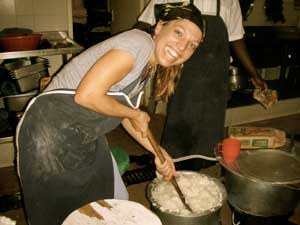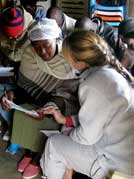Nutrition education for HIV patients in Kenya
June 2010 | Volume 9, Issue 3
It wasn’t your typical cooking course, but Dr. Elizabeth Vaughan studied the nutritional reality of HIV patients in Kenya for five weeks last summer. She interviewed home cooks, hospital cafeteria workers, HIV patients and their families for her research thesis, mastering ten traditional recipes and calculating the nutrient value of 10,000 meals.
“From my first day at the Kijabe Hospital cafeteria, I literally stirred the pot, cooking alongside the head cook. I burned a few things but my mistakes were graciously forgiven. The people in Kenya made it easy to build relationships, which allowed open communication,” says Vaughan. “The experience of HIV in Kenya is dramatic. I’d say a quarter of the people I met had a close friend or relative who was infected.”

Photo courtesy Dr. Vaughan
Dr. Elizabeth Vaughan studied HIV patients’
nutrition in Kenya, mastering 10 traditional
recipes and calculating the nutrient value of
10,000 meals.
She traveled to Kenya from the University of Texas, Galveston, with support from Fogarty’s Framework Programs for Global Health. Vaughan earned her bachelor’s in nutrition and a medical degree on her way to becoming an internist with a master’s in public health.
The main barrier to good nutrition in sub-Saharan Africa is general food scarcity. Kenya also suffers from droughts. “These people eat very little meat, very little protein,” says Vaughan. “One of the staples of the Kenyan diet is ugali, a bland grain-based dish with no protein. It’s similar to cream of wheat or grits but without the nutrients we add in the U.S.”
Logistics were difficult. She took four or five buses a day to see patients, some of whom were illiterate. “Elizabeth’s tenacity, ability to roll with the punches and passion for nutrition, made her research program a success,” says Dr. Philip Keiser, her University of Texas mentor.

Photo courtesy Dr. Vaughan
Vaughan interviewed home
cooks and hospital cafeteria
workers as well as patients
and their families for her
research thesis.
Wanting to give something back, and knowing how vital proper nutrition is to HIV patients, Vaughan gave many talks on the importance of a healthful diet and offered individual advice for making realistic improvements.
“The average Kenyan in these circumstances has a poor diet,” says Vaughan. “At the beginning of the month when they get paid, they eat fruit, vegetables and some meat, but by the end of the month they eat very little and poorly. One of the basics I tried to impart was spacing out good food through the month.”
More Information
To view Adobe PDF files,
download current, free accessible plug-ins from Adobe's website.
Related Fogarty Programs
Related World Regions / Countries